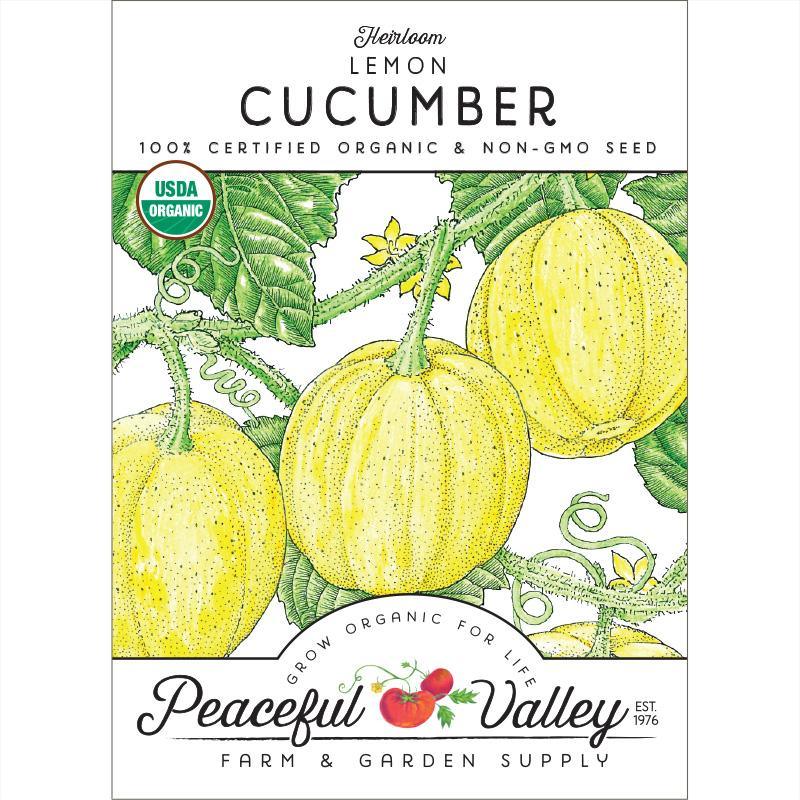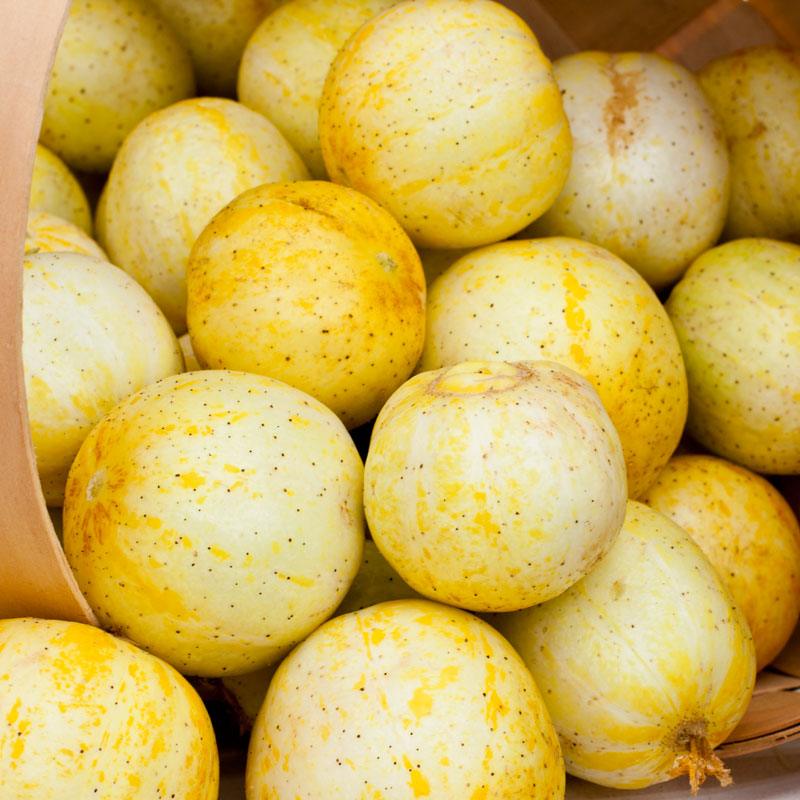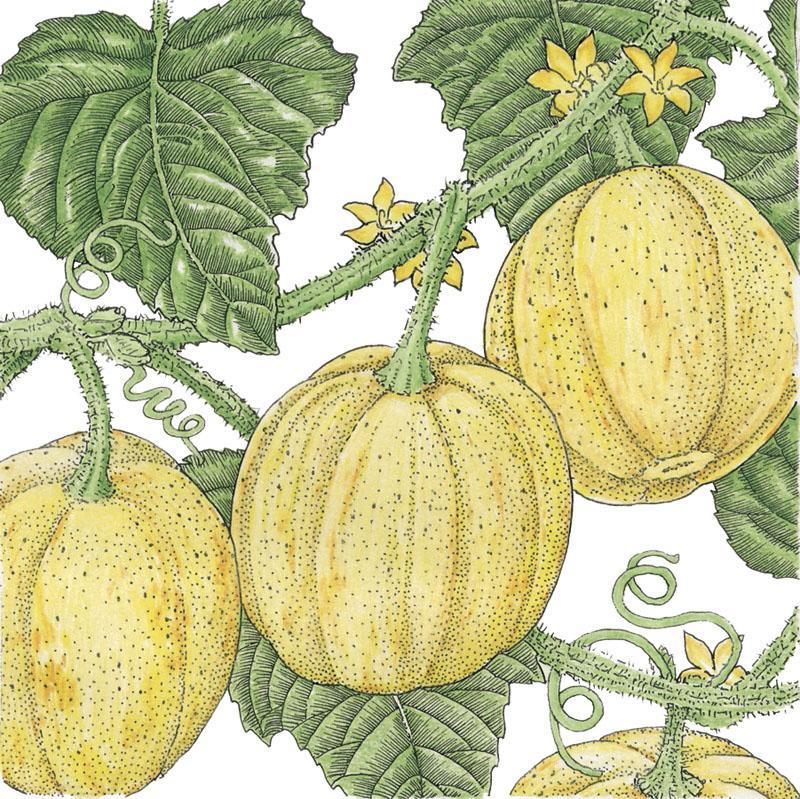Item Number: SNV8049
Lemon Cucumber Seeds (Organic)
Crisp, refreshing, and unique.
Lemon cucumbers are a delightful and unique addition to any garden or plate, offering a refreshing twist on the classic cucumber. Unlike standard varieties, lemon cucumbers are round, about the size of a tennis ball, with bright yellow skin that resembles a lemon—hence their name. Their crisp, juicy flesh delivers a mild, sweet flavor without the bitterness often associated with other cucumbers.
Gardeners love lemon cucumbers for their robust growth and adaptability. These vining cucumbers are ideal for trellis systems, which save space and keep the fruit off the ground, ensuring cleaner and healthier harvests. When harvesting cucumbers, the lemon variety should be picked when they turn golden yellow but remain slightly firm to the touch.
In the kitchen, lemon cucumbers are prized for their versatility. Their mild flavor and tender skin make them perfect for fresh salads, pickling, or simply slicing as a snack. As a companion planting idea, lemon cucumbers thrive alongside beans, marigolds, and sunflowers, which can deter pests and attract beneficial pollinators.
Whether you're seeking a conversation starter for your garden or a fresh flavor for your dishes, lemon cucumbers offer a charming, flavorful alternative to standard cucumber varieties. Their cheerful appearance and delicious taste make them a gardener’s favorite.
Appearance and Taste Profile:
- Unique Appearance: Lemon cucumbers, aptly named for their resemblance to lemons, boast a round, pale yellow-green exterior, distinguishing them from traditional cucumbers.
- Citrus-like Taste: Despite their appearance, Lemon Cucumbers have a mild, refreshing flavor with subtle lemony undertones. This distinct taste adds a delightful twist to dishes and makes them popular among gardeners and cooks alike.
Cultivation:
- Planting Lemon Cucumber Seeds: Start seeds indoors, ensuring a warm environment to encourage germination. Transplant seedlings into the garden after the danger of frost has passed.
- Soil Requirements: Lemon Cucumbers thrive in well-drained soil. Amending soil with compost enhances fertility and moisture retention.
- Raised Bed Gardening: Consider raised garden beds for Lemon Cucumbers, offering better drainage and soil control. Raised beds also prevent soil compaction and facilitate healthier plant growth.
Growing Conditions:
- Sunlight: Lemon Cucumbers need full sun exposure to flourish. Ensure they receive at least 6-8 hours of direct sunlight daily.
- Watering: Maintain consistent soil moisture levels, avoiding both drought and waterlogging. Water at the base of the plants to prevent fungal issues.
- Fertilization: Apply balanced fertilizers during the growing season, providing essential nutrients for healthy plant development.
Harvesting:
- Timing: Lemon Cucumbers are typically ready for harvest in around 65-75 days. Harvest when they are firm, round, and about 2-3 inches in diameter for optimal taste and texture.
- Regular Harvest: Continual harvesting promotes continuous fruit production and prevents overripening.
Culinary Uses:
- Fresh Consumption: Lemon Cucumbers are perfect fresh snacks or additions to salads and sandwiches. Their subtle citrus taste enhances various dishes.
- Pickling: Due to their mild flavor and texture, Lemon Cucumbers are excellent for pickling, creating visually appealing and flavorful pickles.
- Garnishes and Infusions: Thinly sliced Lemon Cucumbers serve as attractive garnishes for beverages or add a subtle lemony essence to infused water.
Challenges and Solutions:
- Pest Management: Utilize pest management strategies to deter common cucumber pests like aphids or cucumber beetles.
- Fungal Diseases: Prevent fungal diseases by maintaining proper spacing, airflow, and consistent soil moisture levels.
Lemon Cucumbers, with their unique appearance and refreshing taste, offer a pleasant addition to gardens and culinary experiences. Whether eaten fresh, pickled, or used as garnishes, these round cucumbers provide a delightful twist to various dishes. Embrace the cultivation process and enjoy the distinct flavor these cucumbers bring to your favorite culinary creations.
Cucumber - Lemon - Cucumis sativus
Tender Annual Heirloom. Almost round and yellow-skinned, this cucumber resembles a lemon but has the classic flavor and sweetness of cucumber. Use it while green and young, or when yellow and fully mature.
Did You Know? Cucumbers are native to India and have been cultivated in their native land for 3,000 years.
Soil & Water: Plant cucumbers in hills or mounds with plenty of added organic matter. Sow 6-7 seeds in a hill, thinning to the 3 best vines.
Planting & Growing: In cool regions, start seeds indoors 10-14 days before the last frost, or sow seeds directly when the soil is at least 70°F. Plant seeds 18" apart if trellised or 36" apart if left to sprawl.
Harvesting & Storage: Harvest while small to medium-sized for best flavor. Keep harvesting fruit, even if misshapen, to keep vines productive.
Soil Temperature: 70-95°F
Planting Depth: 1/2"
Germination: 3-10 Days
Height At Maturity: 1'-4'
Days To Maturity: 58-64 Days
Sun/Shade: Full Sun
Spacing After Thinning: 18"-48"
Approx Seeds per Pack: 50 Seeds | Per 1/4 lb bulk: 3,948
For more information, please enjoy our Resource Guide for planting and growing cucumbers.




Check Your Zone Compatibility:
Compatible with your zone.
Growing Zone for

Our Guarantee To You
Since 1976, we've served our customers at every stage of growing. Please contact us at any time. We are happy to support and assist you.
Shipping Information
Shipping Information
Shipping Weight: 0.01 lb
Dimensions: 4.5"L x 3.25"W x 0.1"H
Features
Features
- Grow on a Trellis
- Heirloom
- Open-Pollinated
- Requires Staking
Characteristics
Characteristics
Planting & Care
Planting & Care
Soil & Water: Plant cucumbers in hills or mounds with plenty of added organic matter. Sow 6-7 seeds in a hill, thinning to the 3 best vines.
Planting & Growing: In cool regions, start seeds indoors 10-14 days before the last frost, or sow seeds directly when the soil is at least 70°F. Plant seeds 18" apart if trellised or 36" apart if left to sprawl.
Harvesting & Storage: Harvest while small to medium-sized for best flavor. Keep harvesting fruit, even if misshapen, to keep vines productive.
Useful Information
Useful Information
Guarantee
Guarantee

Peaceful Valley Farm & Garden Supply brand vegetable seeds are guaranteed to germinate. Once the seeds have sprouted, please understand that Peaceful Valley cannot be held responsible for the many uncontrollable growing and climatic conditions that must be met to ensure the success of your crop(s).
Share



I've never had seeds grow so fast in a pot! I will now transfer them to the soil. I'm so excited about these. Lemon Cukes are the best tasting of all the cucumbers. Thank you for allowing me the pleasure of growing them.




